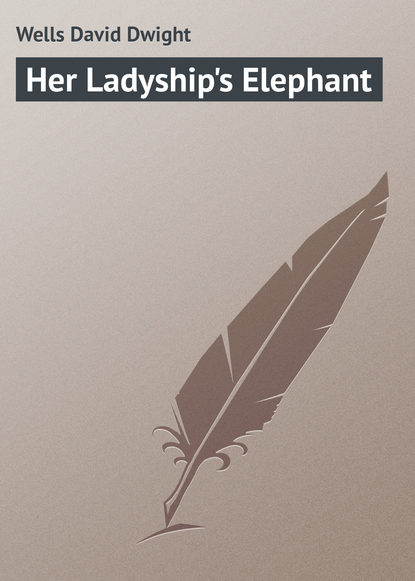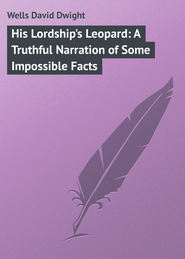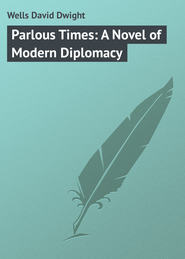По всем вопросам обращайтесь на: info@litportal.ru
(©) 2003-2024.
✖
Her Ladyship's Elephant
Настройки чтения
Размер шрифта
Высота строк
Поля
"Mr. Allingford!" she said, half rising. He had used her Christian name for the first time.
"Forgive me if I call you Marion," he went on, noting with relief that her ladyship was talking charity bazaar to Jack, and so assuring him from interruption.
"I mean, give me the right to do so. You see I'm awfully in love with you; I can't help loving the sweetest girl I know. You must have seen how I cared."
"Lately, yes – I have suspected it," she answered in a low voice.
"Do you mind? I can't help it if you do. I'll love you anyway, but I want you to be my wife, to care for me just a little; I don't ask more."
"I think you must speak to mamma."
"But I don't wish – I mean, can't you give me something to go on – some assurance?"
She blushed and looked down, repeating the phrase, "I think you must speak to mamma."
"Is that equivalent – " he began; then he saw that it was, and added, "My darling!"
Her head sank lower, he had her hand in a moment, and wondered if he might venture to kiss her, screened as they both were by her sunshade, but hesitated to do so because of the ominous silence at the other end of the balcony.
"If you have nothing better to do this evening," said Lady Steele's voice to him, "come to us. Sir Peter and I are dining at home, and if you will partake of a family dinner with us we shall be delighted."
He bowed his acceptance.
"Come, Marion," her ladyship continued. "We have spent a charming afternoon, Mr. Allingford, thanks to your hospitality. We are at home on Thursdays after September; Mr. Carrington, you must come and hear more about my bazaar." And they were gone.
Jack stepped to the bell. "Well, Bob," he said to Allingford, "is it brandy and soda or champagne?"
"Champagne," replied that gentleman.
"Then," remarked Carrington, after ordering a bottle of '80 "Perrier" – "then, Bob, my boy, let me congratulate you."
"I think I deserve it," he replied, as he wrung his friend's hand; "for I believe I have won for my wife the most charming girl in London."
"I am awfully glad for you," said Carrington, "and I consider her a very lucky young woman."
"I don't know about that," returned Allingford, "and I'm sure I don't see what she can find to care for in me. Why, we hardly know each other. I've only met her in public, and not over a couple of dozen times at that."
"Oh, you will find it much more fun becoming acquainted after you are engaged. Our English conventions are beautifully Chinese in some respects."
Allingford laughed, saying: "I don't know that I'm going to be engaged. I can't imagine why her family should approve of the match; I haven't a title and never can have, and I'm only in consular service. Now if I had been a diplomat – "
"My dear fellow," said Carrington, "you seem to forget that you have a few dozen copper-mines at your disposal, and a larger income than you can conveniently spend. Her people haven't forgotten it, however, as I'll venture to prophesy that you'll find out before to-morrow morning. As for your being an American and a Consul, that doesn't count. Just make the settlements sufficiently large, and as long as you don't eat with your knife or drink out of your finger-bowl they will pardon the rest as amiable eccentricities."
"You are a cynic, Carrington, and I don't believe it," said Allingford, rising to go. "Anyway, what do you know about marriage?"
"Nothing, and I am not likely to," rejoined his friend, "but I've lived in London."
The dinner that night at Belgrave Square did not serve to put the Consul at his ease. True, he sat by Marion, but no word was spoken of what had passed that afternoon, and he could not help feeling that he was in an anomalous position. He had on his company manners, and was not at his best in consequence. He felt he was being watched and would be criticised in the drawing-room after dinner, which made him nervous. Sir Peter had several married daughters, one of whom was present, and Allingford wondered how their husbands had behaved under similar circumstances. He gave Lady Steele, at whose right he sat, ample opportunity to question him concerning his family history and future plans and prospects – a chance of which she was not slow to avail herself.
When the ladies had departed and had left the two gentlemen to their coffee and cigars, Sir Peter lost no time in opening the question, and said, somewhat bluntly:
"So I hear that you wish to marry my daughter."
The Consul signified that such was the case.
"I'm sure I don't know why," resumed her father, with true British candour. "I become so used to my children that I sometimes wonder what other people can see in them. Marion is a good little girl, however, I'll say that for her – a good little girl and not extravagant."
Sir Peter's manner was reassuring, and Allingford hastened to say that he was sensible of the great honour Miss Steele had done him in considering his suit, and that he should strive to prove himself worthy of her.
"I don't doubt it, my dear fellow, I don't doubt it." And the baronet paused, smiling so amiably that the Consul was disconcerted, and began to fear an unpleasant surprise.
"I trust," he returned, "that you are not averse to me as a son-in-law?"
"Personally much the reverse; but I always ask the man who comes to me as you have done one question, and on his answer I base my approval or disapproval of his suit."
"And that question is?"
"Can you support a wife, Mr. Allingford?"
"As a gentleman I could not have asked her hand if such were not the case."
"Ah," replied Sir Peter, "that is quite right."
"As for my position – " continued the young man.
"You hold a public office in the service of your country. I consider that sufficient guarantee of your position, both moral and social."
Allingford, who knew something of American practical politics, thought this by no means followed, but forbore to say so, and Sir Peter continued:
"Have you any family?"
"No relations in the world except my younger brother, Dick, who manages the property at home, while I play at politics abroad."
"I see," said his host. "One question more and I have done. I dislike talking business after dinner – it should be left to the lawyers; but, seeing that you are an American and do not understand such things, I thought – "
The Consul stopped him by a gesture. "You are referring to the settlements, Sir Peter," he said. "Set your mind at rest on that score. I'll do the proper thing."
"Of course, my dear fellow, of course; I don't doubt that for a moment. But – er – you won't think me mercenary if I ask you to be – in short – more definite. I speak most disinterestedly, purely out of consideration for my daughter's future."
Allingford frowned slightly as Carrington's prophecy came back to him. His prospective father-in-law was quite within his rights in speaking as he did, but why couldn't he have left it at least till to-morrow?
"Would a copper-mine do?" he said, looking up. "I'd give her a copper-mine."
"Really, I don't know what to say," replied Sir Peter, in some perplexity. "I'm quite ignorant of such matters. Are – er – copper-mines valuable?"
"The one I'm thinking of has been worth a quarter of a million since it started, and we have only begun to work it," replied the Consul.
"Bless my soul!" ejaculated his host. "You don't say so! Do you go in much for that sort of thing?"







